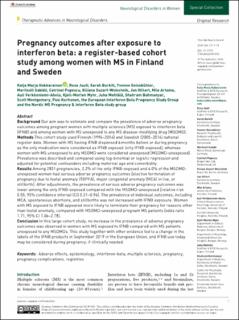Pregnancy outcomes after exposure to interferon beta: a register-based cohort study among women with MS in Finland and Sweden
Hakkarainen, Katja Marja; Juuti, Rosa; Burkill, Sarah; Geissbühler, Yvonne; Sabidó, Meritxell; Popescu, Catrinel; Suzart-Woischnik, Kiliana; Hillert, Jan; Artama, Miia; Verkkoniemi-Ahola, Auli; Myhr, Kjell-Morten; Mehtälä, Juha; Bahmanyar, Shahram; Montgomery, Scott; Korhonen, Pasi
Journal article, Peer reviewed
Published version

Åpne
Permanent lenke
https://hdl.handle.net/11250/2753402Utgivelsesdato
2020Metadata
Vis full innførselSamlinger
- Department of Clinical Medicine [2066]
- Registrations from Cristin [9791]
Originalversjon
Therapeutic Advances in Neurological Disorders. 2020, 13, 1-15. 10.1177/1756286420951072Sammendrag
Background
Our aim was to estimate and compare the prevalence of adverse pregnancy outcomes among pregnant women with multiple sclerosis (MS) exposed to interferon beta (IFNB) and among women with MS unexposed to any MS disease-modifying drug (MSDMD).
Methods
This cohort study used Finnish (1996–2014) and Swedish (2005–2014) national register data. Women with MS having IFNB dispensed 6 months before or during pregnancy as the only medication were considered as IFNB exposed (only IFNB-exposed), whereas women with MS unexposed to any MSDMD were considered unexposed (MSDMD-unexposed). Prevalence was described and compared using log-binomial or logistic regression and adjusted for potential confounders including maternal age and comorbidity.
Results
Among 2831 pregnancies, 2.2% of the only IFNB-exposed and 4.0% of the MSDMD-unexposed women had serious adverse pregnancy outcomes [elective termination of pregnancy due to foetal anomaly (TOPFA), major congenital anomaly (MCA) in live, or stillbirth]. After adjustments, the prevalence of serious adverse pregnancy outcomes was lower among the only IFNB-exposed compared with the MSDMD-unexposed [relative risk 0.55, 95% confidence interval (CI) 0.31–0.96]. The prevalence of individual outcomes, including MCA, spontaneous abortions, and stillbirths was not increased with IFNB exposure. Women with MS exposed to IFNB appeared more likely to terminate their pregnancy for reasons other than foetal anomaly, compared with MSDMD-unexposed pregnant MS patients (odds ratio 1.71, 95% CI 1.06–2.78).
Conclusion
In this large cohort study, no increase in the prevalence of adverse pregnancy outcomes was observed in women with MS exposed to IFNB compared with MS patients unexposed to any MSDMDs. This study together with other evidence led to a change in the labels of the IFNB products in September 2019 in the European Union, and IFNB use today may be considered during pregnancy, if clinically needed.
